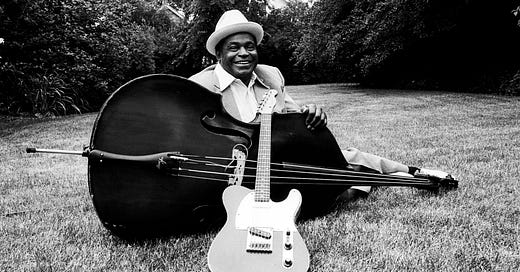Willie Dixon, who died last week (January 29, 1992) in California at 76, was a blues giant in every way and one of the major shapers of the Chicago blues sound.
Born in Vicksburg, Mississippi, his family moved to Chicago when he was 11, and Dixon spent the next few years shuttling between both places until finally settling in Chicago as a boxer, winning a Golden Gloves amateur heavyweight title. By the end of the '30s, Dixon and learned bass and worked in several jive groups until 1951 when he went to work for Chess Records as a talent scout (A&R man), producer, songwriter and session player.
While Dixon performed almost his entire life, working as a duo with pianist Memphis Slim in the '50s and leading his own bands through the '80s, it was as a songwriter that he made his greatest mark. Think of any Chicago blues classic (especially those sung by Muddy Waters and Howling Wolf) from "Hoochie Coochie Man " to "Back Door Man," and the chances are that Dixon wrote it. Virtually everyone who recorded at Chess (with the possible exception of Chuck Berry) did Dixon songs even though they were songwriters in their own right.
It was for Waters and Wolf that he wrote his greatest songs. He had their styles down cold and often wrote songs tailored to their image ("Tail Dragger" for Wolf is a good example). The main difference between the songs that Dixon wrote and the Waters and Wolf wrote for themselves is that they were perhaps a little more down to earth, while Dixon's imagery was often uptown and slick, even when using country metaphors. Waters and Wolf were rivals. Fiercely independent in the studio, wanting to do their own songs and generally suspicious of Dixon's intent, Dixon often had to tell them (particularly Wolf) that he wrote a song for Muddy in order to get him to do it. And those songs (the list is endless from "You Can't Judge a Book By It's Cover" to "Little Red Rooster) have been performed by countless blues and would-be blues bands as well as artists who got their inspiration from the blues.
As a performer and singer, Dixon was entertaining, but nothing special. He simply did not have the vocal chops to pull off his songs with the power that others did. When I saw him in the mid-'80s, his legend clearly won out over his music. But whether he was a great performer or not doesn't matter, for as long as there are blues bands, Willie Dixon songs will be sung.







If you extend your arm full length, thats how far I got to sit from Willie Dixons shoes during a performance he gave at the Belly Up Tavern in San Diego. Him, Muddy, Buddy Guy, man, I did not realize at the time how lucky I was to see them perform up close and personal!